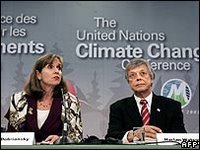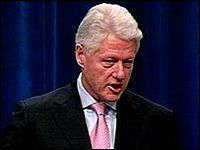Last-minute climate deals reached - BBC
http://news.bbc.co.uk/2/hi/science/nature/4515898.stm
Last Updated: Saturday, 10 December 2005, 12:11 GMT
E-mail this to a friend
Printable version
Last-minute climate deals reached

US negotiators have faced heavy criticism
Ministers at the climate change conference in Montreal have made a series of breakthroughs in plans to combat global warming.
On the conference's last day, Kyoto Protocol signatories agreed to extend the treaty on emissions reductions beyond its 2012 deadline.
And a broader group of countries including the US agreed to non-binding talks on long-term measures.
The US had refused to accept any deal leading to commitments to cuts.
Earlier, former President Bill Clinton said the US approach was "flat wrong".
After Mr Clinton's remarks - which were warmly received - the official US team appeared to shift its position.
'Map for the future'
The BBC's Tim Hirsch in Montreal says the deal was finally agreed in a mood of some euphoria after a last-minute procedural objection by the Russians held up the talks for several hours.
CONFERENCE BUSINESS
--> Details of how to implement the Kyoto Protocol finalised
--> Agreement among Kyoto signatories on plan to deepen emissions cuts after 2012
--> US and other Kyoto non-signatories persuaded to take part in non-binding dialogue workshops
Formal talks can now begin over the precise targets which will be set when the first phase of the Kyoto agreement expires in 2012.
Our correspondent says that, crucially, it sets the scene for discussing how large developing countries like India and China could be brought into the system of limiting greenhouse gas emissions.
Canadian Environment Minister Stephane Dion, who is hosting the conference, described the agreement as "a map for the future, the Montreal Action Plan, the MAP".
Last week delegates finalised a rule book for Kyoto, formally making it fully operational after years of negotiation and ratification.
The 1997 treaty commits industrialised countries to cut their combined carbon emissions to 5% below 1990 levels by 2008-12.
'Meet and surpass'
The US appears to have been stung by negative coverage in the US media after it walked out in protest at Canadian attempts to get it to accept mandatory targets, as well as by Mr Clinton's strong comments , our correspondent says.
"There is no longer any serious doubt that climate change is real, accelerating and caused by human activities"
Bill Clinton
Former US president
Mr Clinton attacked a central plank of the Bush administration's resistance to targets for cutting emissions - that it would harm the US economy.
If the US "had a serious, disciplined effort to apply on a large scale existing clean energy and energy conservation technologies... we could meet and surpass the Kyoto targets easily in a way that would strengthen, not weaken, our economies," he said.
Global warming and melting ice, he suggested, could lead to a future climate conference in Canada being held on "a raft somewhere".
The US has still not budged on its opposition to the Kyoto treaty, and faced heavy criticism for its stance.
Jennifer Morgan, climate-change expert for environmental group WWF, said US negotiator Harlan Watson's decision to leave the talks overnight showed "just how willing the US administration is to walk away from a healthy planet and its responsibilities".
The US rejected the criticism.
"If you want to talk about global consciousness, I'd say there's one country that is focused on action... dialogue... co-operation and... helping the developing world, and that's the United States," said state department spokesman Adam Ereli in Washington.
Despite the row, environmentalists said the conference had been in most respects a success, reaching agreements on how to quantify gas emissions and how to penalise nations for failing to meet Kyoto targets.
E-mail this to a friend
Printable version


0 Comments:
Post a Comment
<< Home